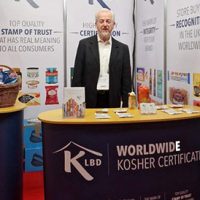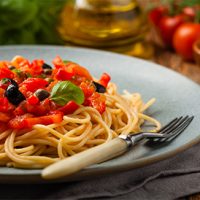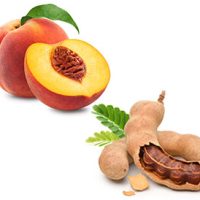The Natural & Organics Show (NOPEX) will be taking centre stage once more at…

Taking Kosher in Britain to New Heights
The Kosher Certification Department is the largest department in the London Beis Din, providing certification for hundreds of factories worldwide, licensing over a hundred caterers, bakeries, restaurants, food manufacturers, delis and stores, and supervising thousands of catered events annually. Thanks to the KLBD (Kashrus Division of the London Beis Din), kosher consumers worldwide can rely on the high standard of kashrus its certification stands for. Like many British institutions, the London Beis Din has a long, venerable history. Dating back over three centuries, it is one of the world’s leading authorities on contemporary Jewish law.
The Kosher Certification Department is the largest department in the Beis Din, providing certification for hundreds of factories worldwide, licensing over a hundred caterers, bakeries, restaurants, food manufacturers, delis and stores, and supervising thousands of catered events annually. Thanks to the KLBD (Kashrus Division of the London Beis Din), kosher consumers worldwide can rely on the high standard of kashrus its certification stands for.
Rabbi Jeremy Conway, Director of the Kashrus Division, is a graduate of Gateshead Yeshiva, Yeshivas Mir in Yerushalayim, and Kollel Chacham Zvi in Amsterdam. Formerly the Rav of the Beth HaMedrash HaGadol in Leeds, he was appointed to head the division in 1988. Since then, the department has grown by leaps and bounds to become a world-recognised kosher hechsher, known for its integrity and reliability. A well-known speaker, Rabbi Conway has been invited to address several European food industry conferences. “The greatest challenge in today’s world is keeping up with change. Food manufacturers are constantly coming up with new ingredients and new processes, and we cannot rest on our laurels. Our mashgichim must be aware of these changes and any potential kashrus ramifications. “Also, the world is smaller nowadays.
Ingredients can be imported easily from across the globe. One factory in England imported citric acid from Israel because it was actually cheaper than the citric acid manufactured by the company right next door! Everyone is looking for the best price. “Every day there is something new. Products are now being produced from unusual sources. Alcohol, used not only in spirits and liqueurs, but found as an ingredient throughout the food industry, is commonly produced from molasses (kosher, pareve) or from grain (potentially chametz). It can also be produced from wine (not kosher) and more recently, from milk (dairy, chalav akum)!”
Rabbi Conway explained that the KLBD has a world-class erudite team consisting of talmidei chachamim and highly qualified professionals with degrees in chemistry, biology and food technology.
“KLBD’s practice of taking and testing samples from companies, as well as being able to talk on the same level of expertise, prevents manufacturers from thinking they can pull the wool over our eyes!” Rabbi Conway explains.
Rabbinic coordinators and senior inspectors in the department are Rabbi Akiva Osher Padwa, Director of Certification; Dr. Moshe Rosenfeld, renowned expert in flavours and food chemicals; and Rabbi Elie Schoemann and Rabbi Shimon Black, senior Certification Coordinators. There are nineteen people working in the London office, over thirty factory inspectors, and more than a hundred involved in catering and restaurant supervision.
When Rabbi Conway was first appointed to the Kashrus Division, there were only eighty factories under its supervision. Twenty-five years later, there are one thousand, a network spanning 60 countries.
The mehadrin certification for London Beis Din hashgachah involves high standards worthy of emulation. Catering supervision is the most complicated, involving different and varied menus, new staff and ingredients, and often working in a non-kosher environment with numerous possible hazards. A mashgiach must be constantly vigilant, tactful, resourceful and scrupulous. An added advantage is possessing eyes at the back of his head! To ensure tight control, the Beis Din maintains a team of fifty mashgichim, headed with a specific Rabbinic coordinator for catering.
Nowadays there is also demand for restaurants with kosher versions of sophisticated world cuisine, including Indian and Chinese food, and of course sushi.
Discussing the number and range of restaurants in Jewish Northwest London, Rabbi Conway observed, “There has been an incredible change over the past decade. Once, we were astonished to have six restaurants; now it’s out of all proportion. It’s very exciting from our perspective.”
There are now more than 40 licensed kosher eateries in London. However, current economics has had an impact on the restaurant business. The famous Bloom’s Restaurant in London’s East End has closed, and several restaurants have changed their style of food, décor, or even location.
“We continue to get new applications almost every week,” Rabbi Conway says. “In the past year, a dozen new food establishments joined the London Beis Din, including new restaurants in the West End of London and in Ilford, areas that previously did not have many kosher eateries.”
Jacques Marciano opened the White Fish restaurant in Hendon, explaining that his desire to run his own restaurant was so great that he went ahead despite the difficulties involved. He also provided insight into the lengthy process of receiving a kashrus license.
“I saw an opening for a nice fish-and-chip restaurant. I went through all the kashrus issues with the London Beis Din. They looked at my background and my kids’ Jewish schooling, everything. We had meetings with the Dayanim. It was a very thorough process. The community is demanding, and the kashrus demands make it harder. Everything involved becomes expensive, but if I can make enough to pay my bills I will be happy.”
Jacky Lipowicz, chairman of the Licensed Kosher Meat Traders’ Association, said new opportunities both in restaurants and at home were developing simultaneously.
“We are offering people a wider range than ever before. Kosher restaurants have become more upmarket. You can now take a non-Jewish colleague to a kosher restaurant and not be embarrassed. The world has changed, and with more women working, they want to buy ready-made, kosher meals. We provide that, and it is now easier to keep kosher. We are doing more to help the consumer.”
Kosher certification of factories by the London Beis Din dates back at least a century. A letter from Chief Rabbi Hermann Adler in 1902 granted his sanction to Marmite, the well-known yeast extract spread. Fry’s cocoa bore “The sanction of the Ecclesiastical Authorities” back in 1910. The London Beis Din’s connections to the far-flung Jewish communities of the British Empire ensured that their halachic influence was worldwide.
These historic links with countries such as Australia and India, combined with improved transportation and globalisation of world markets, resulted in the London Beis Din emerging as a key force in international kosher certification.
Another factor has been the halachic renown of the Dayanim, currently Dayan Menachem Gelley, Senior Dayan, together with Dayan Shmuel Simons, who are involved in Kashrus policy and daily issues.
Unlike other kashrus organizations, the London Beis Din tends to specialize in raw materials and specialty ingredients. Flavours, colours, emulsifiers, food chemicals, dairy derivatives and vitamins are some of the key ingredients that are KLBD certified.
The London Beis Din was among the first kashrus authorities to recognize the kosher problems in many milk derivatives. Rennet casein, a type of milk protein, is similar to cheese, requiring full-time hashgachah. In light of the many potential kashrus hazards involved, the London Beis Din fortunately has the expertise of Rabbi Akiva Padwa for dairy plants in the United Kingdom, Ireland, Europe and Australia.
Although Britain is not known for its wine industry, the London Beis Din has become very active in hashgachah of wine and sherry in countries such as Spain, Italy, Chile and Australia. However, the challenges involved in kosher wine-making are immeasurable, as not only the hashgachah but the entire manufacturing process must be done by shomrei Shabbos. The problem was that frum Jews in Spain are few and far between. Dayan Chanoch Ehrentreu, Rosh Beis Din, came up with a brilliant solution: hiring a team of kollel men from the nearby frum island community of Gibraltar to work in the Spanish wine industry.
He personally supervises the entire challenging, complicated process.
The Kashrus Division maintains close working relationships with all other major kashrus agencies in Europe, Israel and in the United States, including the Badatz Eidah Hachareidis, Rav Landau, the OK, OU, Star- K, and Kof-K and many others. One of the leading Kashrus Rabonim in Eretz Yisroel has said that there is hardly a kosher facility in Israel or Europe today that doesn’t use some component or sub-ingredient certified by the London Beis Din.
As food technology becomes increasingly sophisticated, kashrus agencies must constantly develop and innovate, bearing in mind the words of Rashi at the end of Parashas Shemini: “To distinguish between the impure and the pure it is not enough to know the laws superficially, but one must know [the practical ramifications] and recognize [potential problems] and become expert in them.” This inspiring interpretation is the goal that the London Beis Din aspires to achieve.
As printed in Hamodia Sukkos Supplement
For more information see:





